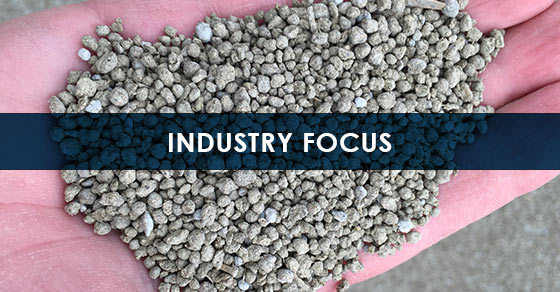Process audits have become an essential tool in helping fertilizer producers improve efficiency, resolve issues, and minimize unnecessary downtime in their production lines.
Whether producing a single nutrient product, a complex fertilizer, specialty product, or even a soil amendment, fertilizer and soil conditioner producers rely on their operation to meet the increasingly demanding needs of the market. When problems arise, or inefficiencies occur, they can rapidly mount into substantial costs. In these situations, FEECO process audits can be a lifeline to identify and resolve issues quickly, bringing the production line back to efficient operation.
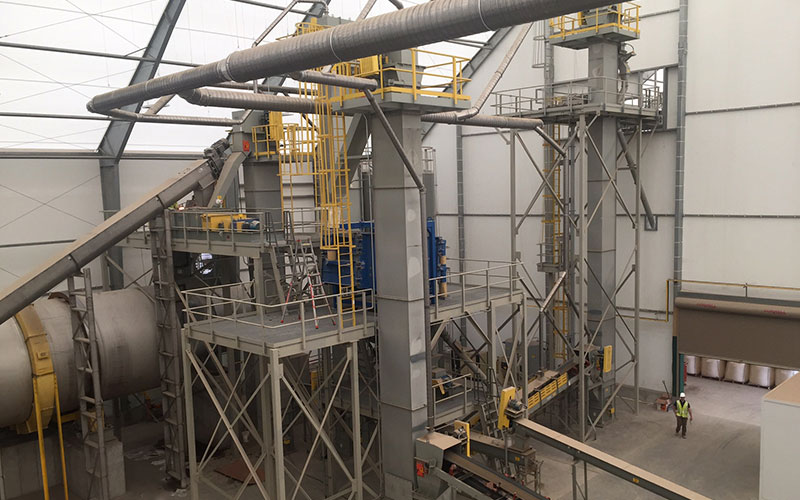
FEECO Fertilizer Granulation Plant
Why Consider a Process Audit?
Since the cost of even minor inefficiencies can be significant in a fertilizer production setting, process audits are incredibly valuable. This is particularly true in two common scenarios:
Conditions Have Changed
Fertilizer granulation is a carefully balanced process. Any change, no matter how small, has the potential to impact the process. This might include a change in feedstock provider, production capacity, the addition of a new material, or otherwise. When conditions change, the process often requires rebalancing.
Process audits are used in this setting to identify how the change has affected the process, and subsequently, how the process can be adjusted to accommodate that change and return to optimal production.
In some cases, a process audit may be used in combination with process development testing to assess a future change in production conditions, without affecting the live production environment.
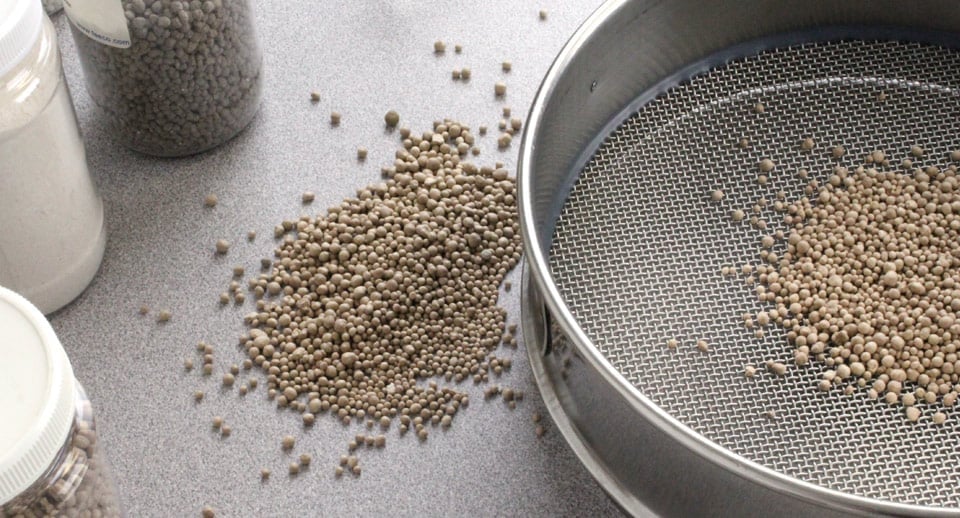
Granular fertilizer produced during testing in the FEECO Innovation Center
The Process is Under-performing
It is not uncommon for seemingly unexplained issues to occur in the fertilizer production process that result in any one of the following:
- A rise in off-spec product
- An increase in product degradation or reduction in quality
- Reduced capacity, or an inability to meet rated capacity
- Frequent process upsets
- Excessive maintenance requirements
When any one of these problems occurs, a process audit can be used to identify and resolve the root cause of the problem, expediting the troubleshooting process and mitigating any inefficiencies and lost production as quickly as possible.
Benefits of a Fertilizer Granulation Process Audit
Process audits can yield a variety of benefits, including:
- Improved product quality
- Lower energy costs
- Increased production
- Minimized downtime
- Reduced equipment wear
- Lower maintenance costs
- Improved operator understanding and performance
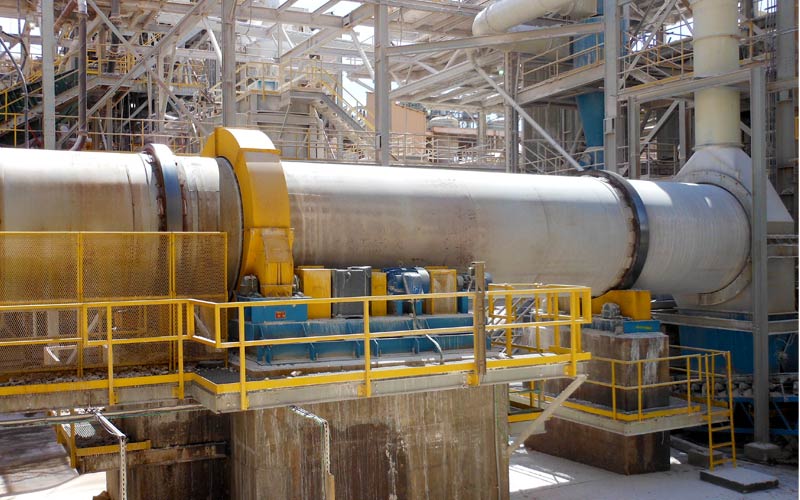
Rotary dryer at fertilizer production plant
While a process audit from any provider has the potential to offer the aforementioned benefits, there are a few key advantages to choosing FEECO for process audits:
Unmatched Experience
We were on the ground floor during the development of the modern fertilizer industry, helping companies around the world to build and convert to the new Tennessee Valley Authority (TVA) method of granulation. Through continuous development of fertilizer production techniques, custom products, and engineered equipment, we have remained the industry’s go-to resource for all things fertilizer granulation. Many of the industry’s most successful companies rely on us to keep their processes online.
Process Development Capabilities
As mentioned, FEECO also offers comprehensive process and product development services through our Innovation Center. Products and processes can be tested at both batch and pilot scale in the Innovation Center to produce samples for testing, gather data for scale-up, and bring the concept to commercialization. This provides value beyond the process audit, giving producers an opportunity to evaluate new formulations, optimize product specifications, and so much more.
We Can Assess Any Brand
One of the critical advantages to our experience is that we’ve seen it all. We are often called in when others fail to achieve results and have become very familiar with competing equipment throughout the years, allowing us to assess and service any brand of equipment.
We Are a Full-Service Provider
FEECO is a full-service provider, meaning that in addition to process audits, we can design and fabricate equipment and retrofits for issue resolution, conduct repairs and maintenance procedures, as well as provide spare parts.
How a FEECO Granulation Process Audit Works
A process audit is based on the customer’s specific production problem and goals, and therefore can vary from one facility to the next. In general, however, a FEECO process audit typically includes the following:
Initial Assessment
The first step in a FEECO process audit typically involves a FEECO Process Engineer comparing the original design parameters with current operating data to assess where deviation exists. The Process Engineer will observe the process and review criteria such as:
- Feedstock parameters
- Feed and binder rates
- Binder concentration
- Spray nozzles and locations
- Moisture ratio
- Retention time
- Drying parameters
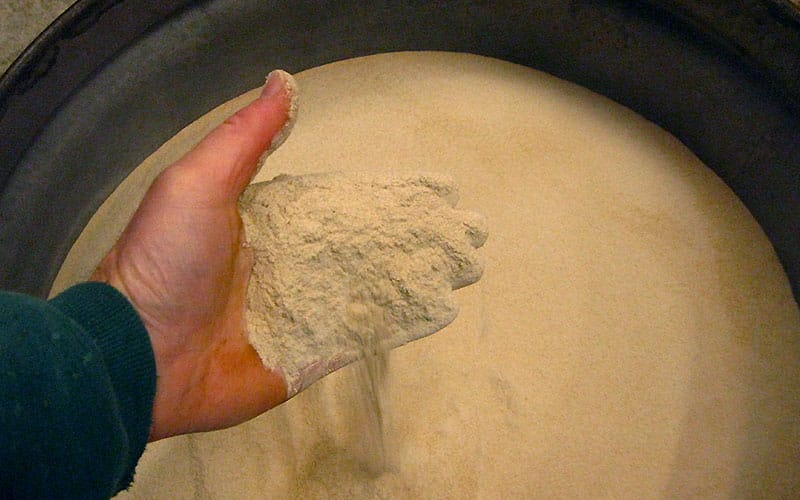
A Customer Service Engineer examines raw material prior to granulation
In combination with reviewing the data and observing the process, the Process Engineer will also work closely with on-site operators to understand the process’s unique challenges.
If optimization is the goal, the Process Engineer will identify ways in which to improve the end product, reduce inefficiencies, and streamline production.
Troubleshooting
If a problem exists and is not readily revealed through the initial assessment, the Process Engineer will move on to systematic troubleshooting based on what is known about the process.
Depending on the issue, this may involve making mechanical and/or process adjustments.
Operator Training
Operators serve as the link between the equipment and the process goals and should be thoroughly trained on the process. As such, FEECO often incorporates operator training into the audit, training operators on the specific subtleties of their process, and helping them to recognize when something is wrong or could be adjusted to improve the process.
Through training, operators typically learn:
- Principles of granulation and how pellets are made
- Considerations in working with their specific material
- How to meet their target product parameters
- Indications of a problem
- Variables to adjust based on what is observed
- How to maintain consistent production of on-size pellets
Reporting
Throughout the process audit, the Process Engineer will keep a detailed record of the assessment, including recommendations, photos, changes made, and even operator knowledge. All of this information will be compiled into a comprehensive report with action items.
Conclusion
Process audits are an important tool for optimizing and troubleshooting fertilizer granulation processes. Whether process conditions have changed, or a production problem exists, process audits can improve the process and provide many benefits along the way.
Serving the fertilizer industry since 1951, FEECO is the industry’s preferred provider for comprehensive process and equipment audits, parts and service support, process development, and custom equipment. For more information on our fertilizer granulation process capabilities, contact us today!



